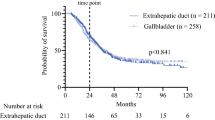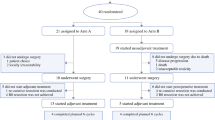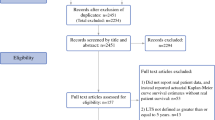Opinion statement
ACs are rare tumors, and thus, there is a lack of prospective trials supporting treatment decisions. Moreover, although anatomically uniform, ACs comprise of biologically distinct entities, depending on what cell type they arise from. This makes the interpretation of limited data even more challenging. Overall, the clinical outcomes of patients with AC are better than those with pancreatic cancer. However, recurrence rates remain high after curative resection. Despite the absence of definitive evidence, we believe that these high recurrence rates are a rational justification for consideration of adjuvant therapy in resected disease, and therapy selection should take tumor biology, stage, resection margins, as well as patient comorbidities and performance status into account. Largely extrapolating from pancreas cancer, we recommend consideration of adjuvant chemotherapy with 6 months of dose-modified FOLFIRINOX in fit patients with pancreatobiliary subtype tumors. Alternative regimens include gemcitabine in combination with capecitabine. If chemoradiotherapy is being added, 6 weeks of radiotherapy in conjunction with 5-FU or capecitabine can be considered. For intestinal subtypes, we recommend 3–6 months of adjuvant FOLFOX. Future studies are needed to evaluate the role of contemporary, multi-agent chemotherapy and chemoradiotherapy in patients with resected and advanced ampullary adenocarcinoma. However, the logistics of performing large randomized trials in patients with a rare cancer is challenging, and the data collection, even in a carefully designed study, would likely take many years. As such, relying on data from basket trials and retrospective analysis will likely serve as guidance for treatment decisions in the near future. Treatment of metastatic disease should employ regimens that are typically used to treat pancreas cancer for tumors of pancreatobiliary subtype and 5-FU-based regimens for intestinal subtypes. Studies specific for patients with advanced AC are much needed. Molecular testing using next-generation sequencing and testing for microsatellite instability (MSI) should be performed on all tumors. We now have disease agnostic options based on these results. Pembrolizumab is approved for MSI-H tumors and tumors with high tumor mutational burden regardless of the primary site. Larotrectinib is approved for tumors with NTRK fusions. At a time when numerous therapeutic agents are in development, for example, those targeting specific K-RAS alterations or NRG fusions, identifying molecular aberrations can significantly impact patient outcomes as well as provide further insights into the biology of disease. In addition, based on recent data suggesting a significant prevalence of germline alterations in patients with ampullary tumors, referral to genetics counselors and germline testing is warranted in a significant proportion of patients with AC.
Similar content being viewed by others
References and Recommended Reading
Albores-Saavedra J, et al. Cancers of the ampulla of Vater: demographics, morphology, and survival based on 5,625 cases from the SEER program. J Surg Oncol. 2009;100(7):598–605.
Ramai D, et al. Demographics, tumor characteristics, treatment, and clinical outcomes of patients with ampullary cancer: a Surveillance, Epidemiology, and End Results (SEER) cohort study. Minerva Gastroenterol Dietol. 2019;65(2):85–90.
Nassour I, et al. Racial and ethnic disparities in a national cohort of ampullary cancer patients. J Surg Oncol. 2018;117(2):220–7.
Sommerville CA, et al. Survival analysis after pancreatic resection for ampullary and pancreatic head carcinoma: an analysis of clinicopathological factors. J Surg Oncol. 2009;100(8):651–6.
Palmeri M, et al. Tissue microarray-chip featuring computerized immunophenotypical characterization more accurately subtypes ampullary adenocarcinoma than routine histology. World J Gastroenterol. 2020;26(43):6822–36.
Chang DK, et al. Histomolecular phenotypes and outcome in adenocarcinoma of the ampulla of Vater. J Clin Oncol. 2013;31(10):1348–56.
Ruemmele P, et al. Histopathologic features and microsatellite instability of cancers of the papilla of Vater and their precursor lesions. Am J Surg Pathol. 2009;33(5):691–704.
Wong W, et al. Ampullary cancer: evaluation of somatic and germline genetic alterations and association with clinical outcomes. Cancer. 2019;125(9):1441–8.
Xue Y, et al. Frequency and clinicopathologic associations of DNA mismatch repair protein deficiency in ampullary carcinoma: routine testing is indicated. Cancer. 2020;126(21):4788–99.
Perkins G, et al. Can we classify ampullary tumours better? Clinical, pathological and molecular features. Results of an AGEO study. Br J Cancer. 2019;120(7):697–702.
Marabelle A, et al. Efficacy of pembrolizumab in patients with noncolorectal high microsatellite instability/mismatch repair-deficient cancer: results from the phase II KEYNOTE-158 study. J Clin Oncol. 2020;38(1):1–10.
Subbiah V, et al. The FDA approval of pembrolizumab for adult and pediatric patients with tumor mutational burden (TMB) >/=10: a decision centered on empowering patients and their physicians. Ann Oncol. 2020;31(9):1115–8.
Kwon MJ, et al. Low incidence of KRAS, BRAF, and PIK3CA mutations in adenocarcinomas of the ampulla of Vater and their prognostic value. Hum Pathol. 2016;50:90–100.
Suto T, et al. Allelotype analysis of the PTEN, Smad4 and DCC genes in biliary tract cancer. Anticancer Res. 2002;22(3):1529–36.
Rostain F, et al. Trends in incidence and management of cancer of the ampulla of Vater. World J Gastroenterol. 2014;20(29):10144–50.
Kim RD, et al. Predictors of failure after pancreaticoduodenectomy for ampullary carcinoma. J Am Coll Surg. 2006;202(1):112–9.
Todoroki T, et al. Patterns and predictors of failure after curative resections of carcinoma of the ampulla of Vater. Ann Surg Oncol. 2003;10(10):1176–83.
Robert PE, et al. Predictors of long-term survival following resection for ampullary carcinoma: a large retrospective French multicentric study. Pancreas. 2014;43(5):692–7.
Park JS, et al. Factors influencing recurrence after curative resection for ampulla of Vater carcinoma. J Surg Oncol. 2007;95(4):286–90.
Qiao QL, et al. Carcinoma of the ampulla of Vater: factors influencing long-term survival of 127 patients with resection. World J Surg. 2007;31(1):137–43.
Doepker MP, et al. Clinicopathologic and survival analysis of resected ampullary adenocarcinoma. J Surg Oncol. 2016;114(2):170–5.
Kamarajah SK, et al. Validation of the American Joint Commission on Cancer (AJCC) 8th Edition Staging System for patients with pancreatic adenocarcinoma: a Surveillance, Epidemiology and End Results (SEER) analysis. Ann Surg Oncol. 2017;24(7):2023–30.
Neoptolemos JP, et al. Effect of adjuvant chemotherapy with fluorouracil plus folinic acid or gemcitabine vs observation on survival in patients with resected periampullary adenocarcinoma: the ESPAC-3 periampullary cancer randomized trial. JAMA. 2012;308(2):147–56.
Takada T, et al. Is postoperative adjuvant chemotherapy useful for gallbladder carcinoma? A phase III multicenter prospective randomized controlled trial in patients with resected pancreaticobiliary carcinoma. Cancer. 2002;95(8):1685–95.
Moekotte AL, et al. Gemcitabine-based adjuvant chemotherapy in subtypes of ampullary adenocarcinoma: international propensity score-matched cohort study. Br J Surg. 2020;107(9):1171–82.
Kamarajah SK, et al. Survival benefit of adjuvant chemotherapy after pancreatoduodenectomy for ampullary adenocarcinoma: a propensity-matched National Cancer Database (NCDB) Analysis. J Gastrointest Surg. 2020;25:1805.
Bhatia S, et al. Adjuvant therapy for ampullary carcinomas: the Mayo Clinic experience. Int J Radiat Oncol Biol Phys. 2006;66(2):514–9.
Narang AK, et al. Evaluation of adjuvant chemoradiation therapy for ampullary adenocarcinoma: the Johns Hopkins Hospital-Mayo Clinic collaborative study. Radiat Oncol. 2011;6:126.
Palta M, et al. Carcinoma of the ampulla of Vater: patterns of failure following resection and benefit of chemoradiotherapy. Ann Surg Oncol. 2012;19(5):1535–40.
Krishnan S, et al. Role of adjuvant chemoradiation therapy in adenocarcinomas of the ampulla of Vater. Int J Radiat Oncol Biol Phys. 2008;70(3):735–43.
Kwon J, et al. Survival benefit of adjuvant chemoradiotherapy in patients with ampulla of Vater cancer: a systematic review and meta-analysis. Ann Surg. 2015;262(1):47–52.
Klinkenbijl JH, et al. Adjuvant radiotherapy and 5-fluorouracil after curative resection of cancer of the pancreas and periampullary region: phase III trial of the EORTC gastrointestinal tract cancer cooperative group. Ann Surg. 1999;230(6):776–82.
Smeenk HG, et al. Long-term survival and metastatic pattern of pancreatic and periampullary cancer after adjuvant chemoradiation or observation: long-term results of EORTC trial 40891. Ann Surg. 2007;246(5):734–40.
Kamarajah SK. Adjuvant radiotherapy following pancreaticoduodenectomy for ampullary adenocarcinoma improves survival in node-positive patients: a propensity score analysis. Clin Transl Oncol. 2018;20(9):1212–8.
Bonet M, et al. Adjuvant therapy for true ampullary cancer: a systematic review. Clin Transl Oncol. 2020;22(8):1407–13.
Jin Z, et al. Prognostic factors and benefits of adjuvant therapy after pancreatoduodenectomy for ampullary adenocarcinoma: Mayo Clinic experience. Eur J Surg Oncol. 2018;44(5):677–83.
Acharya A, et al. Meta-analysis of adjuvant therapy following curative surgery for periampullary adenocarcinoma. Br J Surg. 2017;104(7):814–22.
Manne A, et al. The clinical benefit of adjuvant therapy in long-term survival of early-stage ampullary carcinoma: a single institutional experience. J Clin Med Res. 2020;12(9):560–7.
Ecker BL, et al. Role of adjuvant multimodality therapy after curative-intent resection of ampullary carcinoma. JAMA Surg. 2019;154(8):706–14.
Conroy T, et al. FOLFIRINOX or gemcitabine as adjuvant therapy for pancreatic cancer. N Engl J Med. 2018;379(25):2395–406.
Neoptolemos JP, et al. Comparison of adjuvant gemcitabine and capecitabine with gemcitabine monotherapy in patients with resected pancreatic cancer (ESPAC-4): a multicentre, open-label, randomised, phase 3 trial. Lancet. 2017;389(10073):1011–24.
Valle J, et al. Cisplatin plus gemcitabine versus gemcitabine for biliary tract cancer. N Engl J Med. 2010;362(14):1273–81.
Overman MJ, et al. Phase II study of capecitabine and oxaliplatin for advanced adenocarcinoma of the small bowel and ampulla of Vater. J Clin Oncol. 2009;27(16):2598–603.
Jiang ZQ, et al. A retrospective study of ampullary adenocarcinomas: overall survival and responsiveness to fluoropyrimidine-based chemotherapy. Ann Oncol. 2013;24(9):2349–53.
Andre T, et al. Gemcitabine combined with oxaliplatin (GEMOX) in advanced biliary tract adenocarcinoma: a GERCOR study. Ann Oncol. 2004;15(9):1339–43.
Xiang XJ, et al. A phase II study of modified FOLFOX as first-line chemotherapy in advanced small bowel adenocarcinoma. Anticancer Drugs. 2012;23(5):561–6.
Zaanan A, et al. Second-line chemotherapy with fluorouracil, leucovorin, and irinotecan (FOLFIRI regimen) in patients with advanced small bowel adenocarcinoma after failure of first-line platinum-based chemotherapy: a multicenter AGEO study. Cancer. 2011;117(7):1422–8.
Von Hoff DD, et al. Increased survival in pancreatic cancer with nab-paclitaxel plus gemcitabine. N Engl J Med. 2013;369(18):1691–703.
Conroy T, et al. FOLFIRINOX versus gemcitabine for metastatic pancreatic cancer. N Engl J Med. 2011;364(19):1817–25.
Author information
Authors and Affiliations
Corresponding author
Ethics declarations
Conflict of Interest
Monica Patel declares that she has no conflict of interest. Nataliya V. Uboha declares that she has no conflict of interest. Nataliya V. Uboha has received research funding from Taiho, Eli Lilly, and EMD Serono; has served on advisory boards for Taiho, Incyte, AstraZeneca, Astellas, and QED Therapeutics; and has long position holdings in Natera and Exact Sciences.
Additional information
Publisher’s Note
Springer Nature remains neutral with regard to jurisdictional claims in published maps and institutional affiliations.
This article is part of the Topical Collection on Upper Gastrointestinal Cancers
Rights and permissions
About this article
Cite this article
Patel, M., Uboha, N.V. Treatment Approach to Adenocarcinoma of the Ampulla of Vater. Curr. Treat. Options in Oncol. 22, 103 (2021). https://doi.org/10.1007/s11864-021-00894-5
Accepted:
Published:
DOI: https://doi.org/10.1007/s11864-021-00894-5




